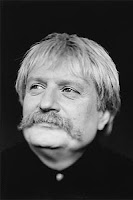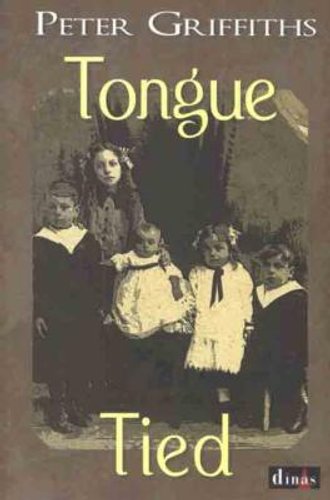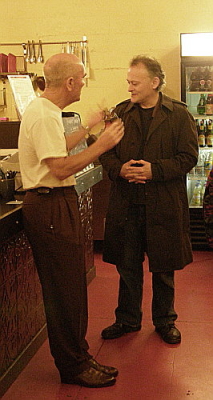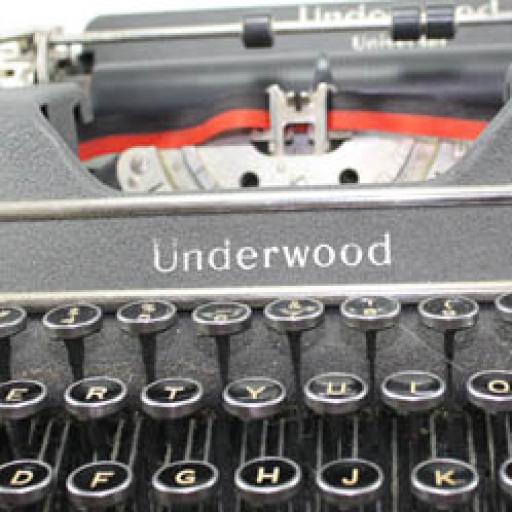
Recently Rated:
Stats
David Western & Laura Gorun's Left Coast Eisteddfod Lovespoon Blog, 30 March 2010, "I'm very excited to be working on another lovespoon for the Left Coast Eisteddfod!"
By gaabi, 2010-03-30
For anyone new to this, lovespoons are a traditional Welsh folk art. David Western and Laura Gorun are lovespoon carvers who have very generously donated their time to create a one-of-a-kind masterpiece in support of the Left Coast Eisteddfod , a Welsh performing arts festival for the west coast of North America. This is David's second year of creation in support of this event and we are very grateful for his and Laura's generosity in sharing their work with us all. For a chance to win their spoon this year, click on the donate button on the blog or in the right-hand column on this page under the Left Coast Eisteddfod Competitions button and be sure to note that your donation is for the lovespoon.
Reprinted with permission from David Western's blog, all material 2010, David Western --
I'm very excited to be working on another lovespoon for the Left Coast Eisteddfod! After the success of last year's spoon and the enthusiastic response it generated for the Left Coast Eisteddfod, we decided to make it an annual event.
 This time, though, I wanted to try something a bit different. I'll be designing and carving this lovespoon in concert with Ohio lovespoon carver, Laura Gorun, so it will very much be a joint effort! Laura is relatively new to lovespoon carving, but her spoons have the sophisticated design and elegant craftsmanship of someone who has been at it for much longer!! I'm certain that working with her is going to yield a really marvelous lovespoon!
This time, though, I wanted to try something a bit different. I'll be designing and carving this lovespoon in concert with Ohio lovespoon carver, Laura Gorun, so it will very much be a joint effort! Laura is relatively new to lovespoon carving, but her spoons have the sophisticated design and elegant craftsmanship of someone who has been at it for much longer!! I'm certain that working with her is going to yield a really marvelous lovespoon!
Although we will be separated by many thousands of miles and have only ever met through the internet, we plan to design the spoon via lots of back-and-forth emails, taking advantage of the incredible opportunities for collaboration the electronic age has opened up.
Our 'theme' for the lovespoon will be "2." As it is the second year of the Eisteddfod, the number 2 seemed a good jumping off point for the design. We also thought that with one of us being male and the other female, one of us fairly new to carving, one an 'oldtimer' and with us living in two different countries, 2 seemed to crop up everywhere. The challenge now will be for us to work that into a viable design!!
When it comes time to carve the lovespoon, we will carve half the spoon each. Like all carvers, we each have elements that we are good at and some that we are not quite as comfortable with, so we will attempt to divvy up the carving so that we each work as much as possible to our strongest suit.
This will be a unique experiment for both of us, especially given that lovespoon carving is generally a pretty solitary endeavour. For both of us, working with another set of ideas and attitutes toward lovespoon carving will both open design doors and create some challenges!
The plan is to work up the design over the next couple of weeks and then begin the carving process. This blog will illustrate what we have been getting up to and will show the whole process from initial rough ideas to the finished piece. Both Laura and I hope that you will enjoy following along and that you will be inspired to donate to the Left Coast Eisteddfod for your chance to win the completed lovespoon!!
Next week we'll post the first set of drawings and then the hard stuff starts!
In the meantime, we hope you will visit us at:
www. BlakesPA.com to view Laura's handmade lovespoons and www.davidwesternlovespoons.com to view David's work
Competitions for the 2010 Left Coast Eisteddfod have been launched on AmeriCymru and we're hard at work planning this year's physical event in Portland, Oregon.
Online competitions this year include poetry in Welsh, Spanish and English with judges respectively John Good , Geraldine Mac Burney and Peter Thabit Jones ; short fiction to be judged again this year by the very excellent Lloyd Jones; Images judged by photographer Glyn Davies .
David Western has very generously offered to create another work of art to support the 2010 event and this year will be collaborating with another artist, lovespoon carver Laura Gorun of Ohio.
David was born in Cardiff but emigrated to Canada, where he now lives in Victoria, British Columbia. Dave has been carving lovespoons for over 20 years and is the author of The Fine Art of Carving Lovespoons . This spoon will be Dave's first collabation with another lovespoon artist and he is delighted to be working with Laura on it.
Laura, a native of Akron, Ohio now lives and carves in Worthington, Ohio. Laura is of Welsh descent through a paternal grandfather and "relatively new" to lovespoon carving. More of her work can be seen here .
This year's blog will follow the process of the creation of the 2010 spoon, with contributions from both artists. As a starting point, they have decided on a theme of "Two" for this year's spoon: two countries, two carvers and the second Eisteddfod. Collaborating on the designing and carving will be a new experience for both Dave and Laura, especially since they live and work in Canada and the US, respectively, a couple of thousand miles apart. The inevitable challenges and learning experiences for both carvers working together should add an interesting twist to this year's blog and the carving experience. On behalf of the Left Coast Eisteddfod, we at AmeriCymru thank you both very, very much for the contribution of your talent, your creativity, your labor and your generous kindness and look forward to the journey of creation of this spoon.
Happy Saint David's Day 2010!
The new button for the store is in the right-hand column and has a t-shirt and a mug on it.
PLEASE, if you're a Welsh speaker and see that I've made a mistake on the few Welsh words I've used, please let me know and how to correct it. I took the words I used from my hard copy "Y Geiriadur Mawr" and the Lampeter University site and it's totally possible I've made a mistake. I'm designing some children's t-shirts with simple Welsh words on them, animals and things kids like, and I want to get it right.
I'm working on more designs, some Uncle Dai which may go on a separate store for the LCE and some St David's Day designs. If there's a design you'd like to see, let me know and I'll see if I can do it justice!

| WIN 2 Tickets to Karl Jenkins '9/11 10th Anniversary Concert'
Dr. Karl Jenkins is one of Britain's greatest and most versatile living composers, the author of an ocean of amazing and exalting music unlimited by genre, style or instrument. He holds a doctorate of musicology from the University of Wales and the Royal Academy of Music London. His many awards include several fellowships at various universities and an OBE (Order of the British Empire) for "services to music." He has composed for jazz bands, orchestra and voice, for advertising, film, and live performance. Dr. Jenkins is a native of the village of Penclawdd in the Gower peninsula, where his father was a school teacher and the choirmaster and organist of the Methodist church the family attended. Two of his most recent works available are Stabat Mater (2008), an adaptation of a 13th century Roman Catholic prayer and Stella Notalis (2009), adaptations and compositions of Christmas carols from around the world. Americymru: You'll be appearing as guest conductor at Carnegie Hall on March 6th . What are the circumstances and what will you be conducting? Karl: As part of Welsh Week I've been asked to conduct some of my music as the first half of the concert. I have a strong relationship with Jonathan Griffith of DCINY who has arranged the event and who has been fantastic in that he has conducted and supported much of my work in the USA. On Martin Luther King Day 2010 he performed my The Armed Man: A Mass for Peace and my Requiem. On this occasion I shall be conducting Palladio [famous for its use on a TV ad for diamonds], two choral extracts, Benedictus & Ave verum [from the Armed Man & Stabat Mater respectively] and the USA premier of my Concerto for Euphonium & Orchestra played by David Childs for whom it was written. Karl Jenkins Conducts "Palladio" Americymru: You're a musician, your wife is a musician, your son is a musician, your daughter-in-law is a musician, your father was a musician, has music always been part of your family's life? Karl: Well obviously that is the case. My father started the ball rolling really since he was hugely influential with regard to my musical education. He taught me piano from an early age and music was always in the house, both live & recorded. My wife Carol Barrat is a celebrated music educationalist while our son, a percussionist and film composer has just scored a Bollywood movie! His wife Rosie, whom he met in the National Youth Orchestra of Great Britain is currently playing oboe with the London Symphony Orchetra. Americymru: You've said in other interviews and your biography that your father was the organist and choirmaster at your village's Methodist chapel, was he the greatest musical influence in your life? Do you think you've been the same influence in your son's life? Karl: What we've done as parents is introduce Jody to music and by default, the musicians life so he's quite worldly for a young man [he's 28]. We did not force him in any way and having played piano & flute as a child, he asked to play percussion when he was ten. This was his instrument and became principal in the aforementioned NYOGB, won a scholarship to the Royal Academy of Music [where I had studied 30 years before] and graduated with first class honours. So, he's been his own man really but I suppose it helps in that we work in different areas. What we do all share as a family is a love of all good music, regardless of categorisation, and in any genre. Americymru: How would you describe Welsh congregational singing to someone who's never seen it? Would you say that growing up with that musical experience effected or enriched you as a composer? Karl: It's obviously hard to describe music in words but what makes it unique is the rawness of the vocal sound. On the printed page it looks like any other four part hymn but the sound, to me anyway, is hugely atmospheric especially when sung in Welsh. The sound influenced my Adiemus project which had a degree of global success. This was a mix of the 'classical' but with voices that were not from the European classical tradition but more "tribal". The text was my own invented language. Americymru: You've performed and composed a very wide variety of instruments and styles of music and incorporate a great variety in your work, from the 13th century Roman Catholic Stabat Mater to Japanese haiku and African folk - what inspires or directs fitting these styles together in a piece? Where do you start writing music or creating music? Karl: My musical journey, following academic classical training at Cardiff University & the RAM, has taken in a wide variety of genres and I've arrived at what I do now by way of being a musical tourist. Essentially I am a composer who always looks outside the European tradition for influences, texts & instrumentation, particularly percussion. With regard starting a piece, if I'm setting words then I immediately have a peg on which to hang the piece. If it's instrumental or Adiemus then I'm on my own! The principle is searching around for ideas [usually using a piano] and developing what takes my fancy. A huge amount of intuition is involved, but intuition based on an armoury of acquired musical craft; harmony, counterpoint, orchestration, form et. Americymru: "Stabat" Mater (2008) is your adaptation of a 13th century Catholic liturgical hymn, in which you included an amazing variety of instruments and material from sources as wide as 13th century Persian poetry and the Epic of Gilgamesh, how did you come to create this, what was your process in expressing this? Karl: Well the established text is there already. Then much of what I have expressed above came in to play, looking outside Europe to the Middle East/Holy Land for relevant [i.e. concerning grief] ancient text, employing languages that were lingua franca at the time and including indigenous instruments in the orchestration. The eminent Welsh poet [and academic] Grahame Davies [who wrote the words for my recently composed anthem for the National Assembly of Wales] did quite a bit of research for me with regard to the literature. Americymru: You've said in interviews before that you "don't see any point in being a composer if you don't communicate with people," what does that mean to you? Do you feel that response in the audience is important, that response is the "product" or goal of a piece of art or music? What response do you want to create in your audiences? Karl: I believe music should emotionally connect with an audience; make them cry, laugh, administer 'goose bumps! I've heard far too much music with 'one man and his dog' in the audience, the piece never heard again and the event receiving "critical acclaim". Americymru: Wales seems to produce a lot of musical artists who would be (or are) described as "crossover", yourself included - do you think Wales has a musical character or tradition that inspires or tends toward experimentation or something like hybridization, a lack of adherence to artificial limitations of genre? Karl: I don't like to use the term cross-over. I'm not sure what it means and I've explained what I do above. I don't think the Welsh like music particularly. What they do like are singers which is not necessarily the same thing. I like to think that what I do is at least individual and at least it's new. Most albums and repertoire [not just by Welsh artists] are a series of singers singing the same songs, songs that everyone knows. Many such artists are described as opera singers when they have never sang in an opera in their lives. At least good modern 'pop' has more integrity since it is newly composed. Americymru: Did you have particular creative goals as an artist and if you did, have you achieved them? What would you like to look back on at the end of your life and see that you did or created? Karl: Following my journey, I have come relatively late in life to what I do now, but the corollary is that I would not have arrived at this point without this musical tourism and the influence and skills that have come with it. There is still much to do. I'm setting the Gloria text for a Royal Albert Hall premier in July and there is much more to do. Americymru: Is there any particular instrument you especially like to compose for? If so, what instrument and why? Karl: Sounds pompous [which I'm not] but my instrument is the orchestra [& choir] and the rich palette of colours it provides. Americymru: Is there any one work or piece that you created that you're particularly proud of or happy to have done? If so, what is it and why? Karl: The worrying thing is that some of my most popular pieces were kind of written quickly and which I didn't set great store by. However, I suppose the Armed Man because of it's impact but I think there is better music in the Requiem. Americymru: What music do you listen to for pleasure? Karl: I listen far less than I did, most certainly because I'm always writing and I need a break! Favourites would be Mahler, Strauss, Wagner, Bach, Stravinsky, Miles Davis, John Coltrane, Weather Report, Steely Dan........ |
Contest! WIN 2 Tickets to Performance of KARL JENKINS "REQUIEM" and "THE ARMED MAN" on January 18th in New York City!!!!
By gaabi, 2010-01-07
Distinguished Concerts International has very generously offered us 2 FREE TICKETS to a special concert performance of Karl Jenkins' "Requiem" and "The Armed Man: A Mass for Peace" at Avery Fisher Hall, 10 Lincoln Center Plaza in New York on January 18, 2010. These performances will feature (among others) soprano Erika Powell, the Jonathan Griffith Singers and Treble Geraint Llyr Owen.
Unfortunately, (sob, sob, sob!!!), Ceri and I can't get to NYC on January 18th, so, in true AmeriCymru fashion, we're making it a QUIZ PRIZE!
That's right, you, yes, YOU , could win these two tickets to a gala, glorious evening of beautiful music and artistic splendor, seated like royalty in a chance to get your fine duds on and soak up the works of Wales' greatest living classical composer with the companion of your choice (who will, of course, be wildly impressed).
Answer the quiz questions below and send them to us at americymrucontest@gmail.com . We'll throw all the entries in a hat and pick the winner! Please email us by Friday, January 15, no later than 9 AM. Tickets will be ready at will call on 1/18 at Avery Fisher Hall; the winner will just need to bring a photo ID. ( Only one entry per email address is permitted. Duplicates will be disqualified )
The Quiz
- In what Welsh town was Karl Jenkins born?
- With what instrument did Karl Jenkins join the National Youth Orchestra of Wales?
- In what rock band did Karl Jenkins play?
- What was Karl Jenkins' first major project as a composer?
Karl Jenkins Conducts "Palladio"
For more information on the concert:
http://www.dciny.org/2010-opportunities/monday-january-18.html
Peter Griffiths, author of Tongue Tied , invited AmeriCymru members in Portland to a reading and discussion of his book at the Clearing Cafe on NW Thurman in Portland last Monday evening.
| | |
Peter and his wife, Yvonne, hosted the gathering at the Clearing Cafe, owned by their son, Andrew Griffiths, and his wife, Kelley Winchester, to celebrate the second printing of Peter's book by YLlofa. The senior Griffiths live in Colorado and travel to Portland to visit and will be back for the 2010 NAFOW in September.
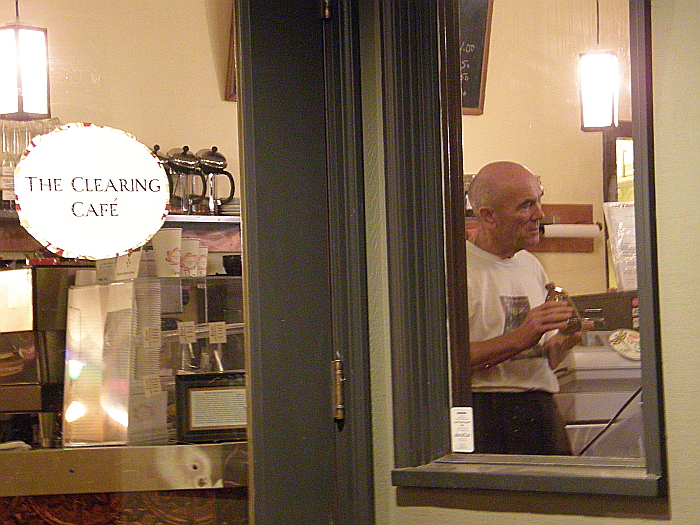
Peter gave readings from the book, discussed some of his process in creating it and answered questions. He described how he'd used cynghanedd (the concept of sound-arrangement within one line in Welsh language poetry, using stress, alliteration and rhyme) to some of the lines here and there throughout the book, and read examples to show how he'd applied these concepts to an English-language prose work.
| | |
Peter and Yvonne's son, Andrew was born in Wrexham and his wife and partner, Kelly in New York. Although they both spent a lot of their early lives in Colorado, they met in Portland while working at the same bakery. They recently bought the cafe, which had been in business more than two years in that location, and they've kept the cafe's menu, which includes bagels, panini sandwiches, rice and bean bowls, salads, smoothies and juices and a good variety of teas and coffees. Wherever possible, they use local and organic ingredients for everything they make. They plan to introduce Welsh dishes to their menu, starting with Welsh cakes, and add beer and wine, so those of us in Portland can look forward to somewhere with a more specifically Welsh flavor to go. Andrew put on the red and green for the occasion and sported the Ddraig Goch on his tie to welcome us all.
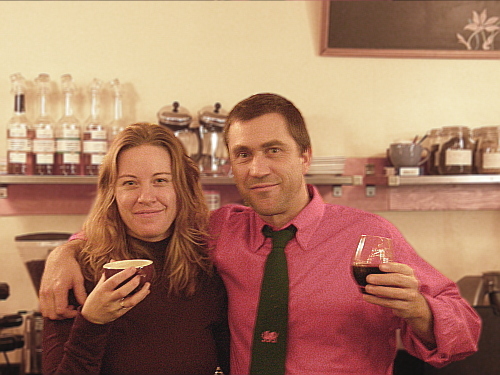
An interview with Peter appears on the AmeriCymru blog and Ceri's review of Tongue Tied will be up shortly.



